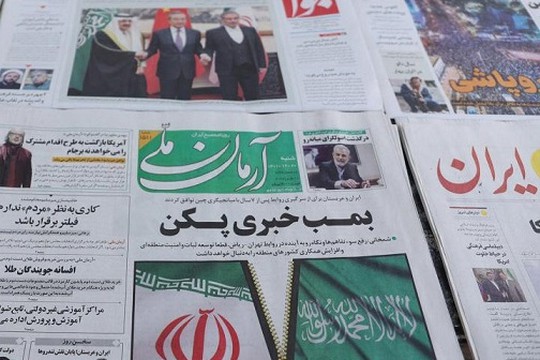The agreement to reestablish diplomatic relations between Tehran and Riyadh was no “peace deal,” but the rivals did decide to cool tensions and reopen embassies after a seven-year lapse. China’s role in facilitating the deal raised the most consternation in Washington, leading some to declare that “a new era of geopolitics” had begun and assert that the agreement topped “anything the U.S. has been able to achieve in the region since Biden came to office,” writes Grant Rumley, a Goldberger Fellow at the Washington Institute for Near East Policy.
Reports on the new agreement suggest that both sides were readily able to reach consensus on important issues, at least on paper. Riyadh apparently agreed to soften coverage on Iran International, the London-based media outlet funded by Saudis, which Tehran has depicted as the leading anti-regime instigator throughout the recent protest movement. In return, Iran reportedly agreed to encourage its Houthi allies in Yemen to maintain the current year-long truce. Since that war began in 2015, Saudi Arabia has spent millions of dollars defending its territory against Houthi missile and drone attacks, which have often targeted major civilian sites. In short, Riyadh and Tehran already had strong incentives to take at least a few initial diplomatic steps to bolster their internal stability.
According to the trilateral statement issued on March 10, Iran and Saudi Arabia agreed to “resume diplomatic relations” and reopen their embassies within two months. They also affirmed their “respect for the sovereignty of states and...non-interference in internal affairs,” as well as their intention to implement their 2001 security cooperation agreement and their 1998 deal covering economic, cultural, and scientific cooperation.
Yet the 2001 security cooperation agreement includes generic language encouraging information sharing and joint training to counter organized crime, terrorism, and drug trafficking, it does not provide a specific path toward initiating such cooperation. Moreover, the trilateral statement makes painstakingly clear that China’s role was “hosting and sponsoring talks,” and it may host another regional summit later this year.
Washington should therefore be clear-eyed about what Beijing’s mediation means — and what it doesn’t.
China’s investment in the Middle East will likely continue growing; after all, it is the region’s dominant economic force and has long sought to match its diplomatic standing with its sizable economic footprint.
Until now, its diplomatic reputation in the region has not been challenged by realities on the ground. Getting Iran and Saudi Arabia to publicly agree on a de-escalation accord is a win to be sure.
…This is how they see the US policy, which until recently influenced Iran and Saudi Arabia. Now times have changed:

read more in our Telegram-channel https://t.me/The_International_Affairs

 9:59 01.04.2023 •
9:59 01.04.2023 •























